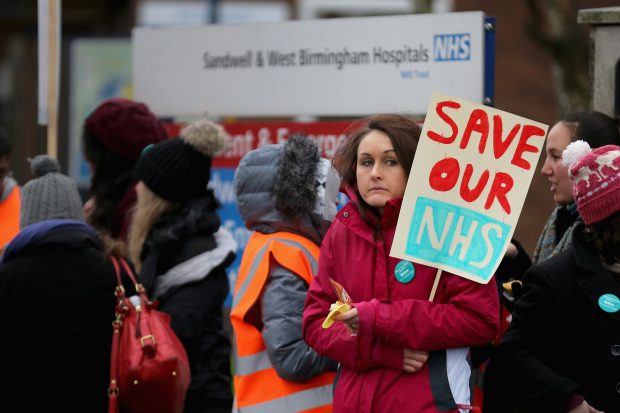When the BMA announced a new round of strikes they will have been prepared for a backlash from certain quarters. The criticism yesterday from Jeremy Hunt and Theresa May, who accused striking doctors of ‘playing politics’, won’t have come as a surprise. But what is different about this latest, unprecedented industrial action are the attacks on junior doctors now coming from fellow medics. For the Academy of Medical Royal Colleges to intervene as they did last night indicates a significant shift in this drawn-out dispute. Here’s what they said in a statement:
‘The Academy of Medical Royal Colleges is disappointed at the prospect of further sustained industrial action by junior doctors. We are acutely aware that the NHS is under extreme pressure at the moment. Patient safety and quality of care must be the priority. We know there are genuine concerns about the contract and working arrangements, but we do not consider the proposed strikes are proportionate. Five days of strike action, particularly at such short notice, will cause real problems for patients, the service and the profession.’
It’s certainly terse and if you compare the AMRC’s words with the ones they issued back in March, you get a sense that something has changed. In that earlier statement, the emphasis was on ‘both sides’ to resolve the stand-off. That’s now gone: instead, senior doctors are making it clear who they’re blaming for the latest industrial action. And it isn’t Jeremy Hunt.
But it’s not only senior doctors who have shifted their position on this industrial action. If you look into the justification given by the BMA for striking, you also spot a shift in justification, which seems to expose the shallow regard given to patients this time around. During the first four set of strikes earlier this year, junior doctors made it clear they would continue to provide emergency care. The strikes, too, were relatively short (none lasted for more than two days, even when, later strikes did include emergency care) and a fair degree of notice was given to hospital bosses to accommodate for the walk-outs. The emphasis, the BMA insisted, was on ensuring patient safety -whilst still allowing junior doctors to vent their opposition to the new contracts. But that same careful balance of care now seems to have vanished into thin air. The industrial action this time around has been proposed with just a few days’ notice. Emergency departments will also be affected by this latest round of strikes. And the period which junior doctors will be striking for is unprecedented: they’ll be walking out for five days, and doing so in September, October and November.
The tide of public opinion against this industrial action is turning. That much is clear from the scale of opposition in this morning’s newspapers. Yet it’s also clear that these strikes are lacking support from more surprising quarters. The BMA itself only backed the strikes by 16 to 12 – a count which gives a clear picture that these strikes are different. Last November, 98 per cent of junior doctors backed the BMA’s plan for industrial action. As the BMA pointed out then, this demonstrated the strength of opposition against the Government’s plans. Now, in the face of fire from fellow medics, that resolve is wavering. And the sooner junior doctors call off this strike, the better for avoiding damaging their already dented image.







Comments